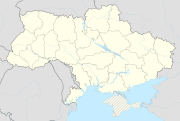Brazlaw
| Brazlaw | ||
| Брацлав | ||

|
|
|
| Basic data | ||
|---|---|---|
| Oblast : | Vinnytsia Oblast | |
| Rajon : | Nemyriv Raion | |
| Height : | 201 m | |
| Area : | 19.2 km² | |
| Residents : | 6,033 (2005) | |
| Population density : | 314 inhabitants per km² | |
| Postcodes : | 22870 | |
| Area code : | +380 4331 | |
| Geographic location : | 48 ° 50 ′ N , 28 ° 57 ′ E | |
| KOATUU : | 523055300 | |
| Administrative structure : | 1 urban-type settlement | |
| Mayor : | Dmytro Broda | |
| Address: | вул. Енгельса 15 22870 Брацлав |
|
| Website : | http://bratslav.at.ua/ | |
| Statistical information | ||
|
|
||
Brazlaw ( Ukrainian and Russian Брацлав ; Polish Bracław Yiddish בראָסלעוו Broslev ) is an urban-type settlement in Vinnytsia Oblast of Ukraine with about 6,000 inhabitants. The village is located on the Southern Bug in the historic Podolia region .
history
Brazlaw largely shares the history of Ukraine and Poland .
Brazlaw Castle was built in 1362 on the territory of the then Principality of Halych-Volhynia . In 1479, the area around the castle was destroyed by the Crimean Tatars , killing 600 inhabitants, including 400 Jews . Brazlaw served as an important border fortification against the Islamic empires in the south. Despite strong fortifications, it was conquered by the Crimean Khanate in 1551 . 1569, the site received from the Polish King Sigismund II. August the Magdeburg rights and has since been a "free city".
Since the beginning of the 16th century there was an important Jewish Hasidic community in the city (Yiddish בראָסלעוו / Broslev ). From 1370 to 1569, as the center of the Brazlawschtschyna area, the city belonged to the Grand Duchy of Lithuania , then to Poland-Lithuania and until 1598 was the center of the Bracław Voivodeship . In the voivodeship, 60,000 of the 65,000 households were owned by 18 magnate families . In 1648 the city came under the rule of Bohdan Khmelnyzkyj as a result of the Khmelnytskyi uprising . All Jews were killed in a pogrom .
As a result of the Ottoman-Polish War 1672–1676 , Brazlaw fell under Ottoman rule with Podolia from 1672 to 1699 , before falling back to Poland as part of the military defeat of the Ottomans. Finally, with the Second Partition of Poland in 1793 , the city became part of the Russian Empire in the Podolia Governorate . From 1802 to 1810 Rabbi Nachman, the founder of an important Hasidic school, the Bratslav Hasidim , taught in the city. In 1895 the city had 2,460 Jewish residents, around 40% of the total population.
Since the city had no rail connection, it lost a lot of its importance in the 19th century. After the First World War Brazlaw belonged temporarily to the People's Republic of Ukraine . Between May 1919 and March 1921 there were numerous pogroms with over 200 Jews killed. Many Jews then moved to larger cities. In 1939 Jews made up around 1,000 of a total of 4,000 inhabitants. After Ukraine's defeat by Soviet Russia , the area was disputed in the Polish-Soviet War of 1920 and eventually came to the Ukrainian Soviet Socialist Republic .
On July 22, 1941 Brazlaw was occupied by the German army and incorporated into the Romanian occupation area of Transnistria . A ghetto was established in the place and filled with deported Jews from Bessarabia and the former Bukovina . At the beginning of 1942, the ghetto residents were shot or taken to concentration camps. On March 17, 1944, the Red Army captured the place and Brazlaw was again incorporated into the Ukrainian SSR. Since the collapse of the Soviet Union in 1991, the village has belonged to the independent Ukraine.
Brazlaw's sons and daughters
- Ivan Bohun (1618–1664), Ukrainian freedom fighter
- Mejer Furschtschik (1886–1944), Soviet philosopher
Web links
- Bratslav on History of Jewish Communities in Ukraine (English, German). Retrieved November 20, 2016.
Individual evidence
- ↑ a b c Bratzlav in the Jewish Encyclopedia
- ^ Encyclopedia of Ukraine
- ↑ Orest Subtelny: Ukraine. A history . University of Toronto Press, Toronto 1993, ISBN 0-8020-7191-0 , pp. 108 .
- ↑ Брацлавські хасиди. Хто вони?
- ↑ a b c Bratslav in the Jewish Virtual Library
- ↑ History of the Jews in Bukovina on JewishGen

